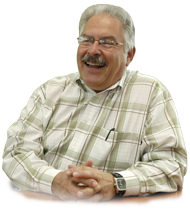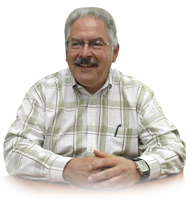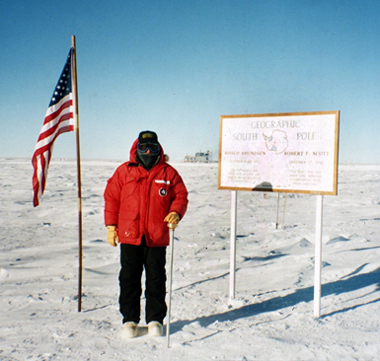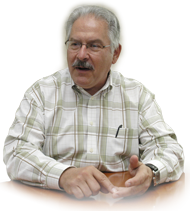A Conversation With... Allen Macenski
(Editor’s note: The transition to management by Lawrence Livermore National Security has brought a few new as well as some familiar faces to the Lab's senior management. Newsline features "A Conversation with…" a series of profiles on the Laboratory’s new leadership. This week, meet Allen Macenski.)
What you wanted to be when you were a kid:
I wanted to be a baseball player for the Milwaukee Braves. As a kid, the entertainment value in listening to Braves games was paramount in my existence. I played baseball as a kid and all through high school and college. That was my drive in life. What changed my career path was the need to get a job and earn a living. After my college days, I decided my aspirations would have to turn to something that was more viable and more reliable.
First job:
My first job was for the Employers Insurance Company of Wausau, where I handled industrial hygiene for policy holder service calls for the company’s Pacific region.
Guiding principle:
My guiding principal is to treat people as I would want to be treated.
Work philosophy:
My philosophy is that work is only one element of a balanced life; and a balanced life has to be managed. By that, I mean you only have 24 hours in a day, so you have to manage the allocation of those hours to create a quality of life that’s important to you and to your family. I don’t think work should dominate one’s life. You have to live other aspects of your existence, and I try to manage a balanced approach to that. I learned that from my mother, who said, "There’s a time for everything and you have to make time for everything that’s important to you." I try to establish my management style around the same principles. The members of my team need to take time to experience other aspects of life that are rewarding to them. Really, when they do that they are much more valuable to me.
Best decision:
That was entering into the occupational health and safety profession. I changed my major three times in college. I started off studying history, but then my mother asked me what I intended to do with that when I got out of college. I then went into engineering, where I wound up taking a course in the occupation and environment arena. I discovered it was an emerging field and decided it was something I’d like to do. So, I switched my major to environmental/occupational health sciences and fell in love with the fact that you’re working to protect people, property and the environment, and those are sort of my values to begin with. I’ve been able to be a part of that profession for more than 30 years.
Worst decision:
Not buying that 26-unit motel on the north shore of Lake Tahoe in 1968 for $98,000. I was on my first trip to Lake Tahoe and saw a "For Sale" sign in the window of the motel office. I talked with the owner and thought about it, but finally decided that was just too much money. That motel is still there today, but now it’s part of a national chain and probably worth a hundred times as much.
Career highlight:
One was working in Antarctica for a company that took care of support operations for the McMurdo Research Station there. I directed ESH&Q for base operations, and was responsible for complying with environmental and regulatory requirements. I thought Antarctica was one of the prettiest places on earth, and the people there worked and lived in a strong team environment. You learned to depend upon other people, and they depended on you, just to stay alive. The landscape, the wildlife…it was incredible. I worked the spring and summer seasons there from 1992 to 1996. There was one white-out storm in which we became trapped away from the main base for 72 hours. Winds were blowing at more than 100 miles per hour, and it was -50 degrees Fahrenheit.
The other highlight was working at Chernobyl for Bechtel, which had the job to construct a replacement concrete sarcophagus to surround the ruined reactor. I had global responsibility for ES&H for Bechtel’s government operations, and I assessed ES&H practices before construction could begin on the sarcophagus. It was a challenging task, given the radiation safety culture at Chernobyl at the time. I witnessed the results of the evacuation of local people from the area, and the effects of the accident on the culture and the land. It was very interesting.
Career low point:
Losing Bechtel’s re-compete bid for the Nevada Test Site management contract. It’s my competitive spirit, I guess. I hate to be on a losing team.
Word or phrase that best describes you:
People person.
Interests/hobbies:
I enjoy golf; walking with my wife, Paula, and our two dogs, Brutus and Ginger; and shooting pool. My talent at pool helped me augment my financial resources during my college years.
Favorite book/movie: (or what cartoon character/super hero is most like you; actor/actress who’d play you in a movie)
Favorite movie is One Flew Over the Cuckoo’s Nest, with Jack Nicholson. He has such class, the way he holds himself. I wish I was Jack Nicholson.
Favorite food:
My wife’s beef stroganoff. She has a recipe that’s held my attention for 31 years.
Pet peeves:
People who forget promises they made, and how that impacts building and keeping trusting relationships.
Person you’d most like to meet:
I’d like to meet Tiger Woods, and not just because I like golf. People see him in his role as a professional golfer, but most don’t realize that Tiger’s real interest is humanitarianism. His Tiger Woods Academies across the United States help kids in areas where there are limited opportunities or resources for education. I’d like to know more about how he manages his foundation.
Best vacation ever:
The one I’m planning next. It’s always the next one. You get to think about and plan where you’ll go and what you’ll do and experience. That anticipation and planning adds to the overall enjoyment. My wife and I are thinking of a trip to Italy.
Next career goal:
I want to see the Lab reach five million hours without a lost workday injury to any worker. At NTS, we achieved nine million hours without a lost workday, which was an NTS record. I think the cultural conditions at NTS were very similar to those here at LLNL now. If we just take care of today and stay safe today, tomorrow and the day after, that will take care of themselves.
How do you deal with stress:
Not well. I internalize it. I hit the golf ball as hard as I can and go on long walks with my wife. It goes back to my competitive spirit, I guess, which sometimes leads me to create my own stress. But I try not to infect others with my stress. I work to manage my own stress, but I know I won’t always be successful. But that’s just a part of life on this earth.
Characteristic you most and least admire in people:
I most admire truth and honesty. My grandfather, who came to the United States from Poland, told us to be honest and to treat people fairly. What I dislike is the opposite: people who are dishonest or deceitful.
Best piece of advice you’ve received:
A college friend of mine said to me 30 years ago: "I know this girl who you would get along with. You need to meet her." I took his advice and met my future wife.








